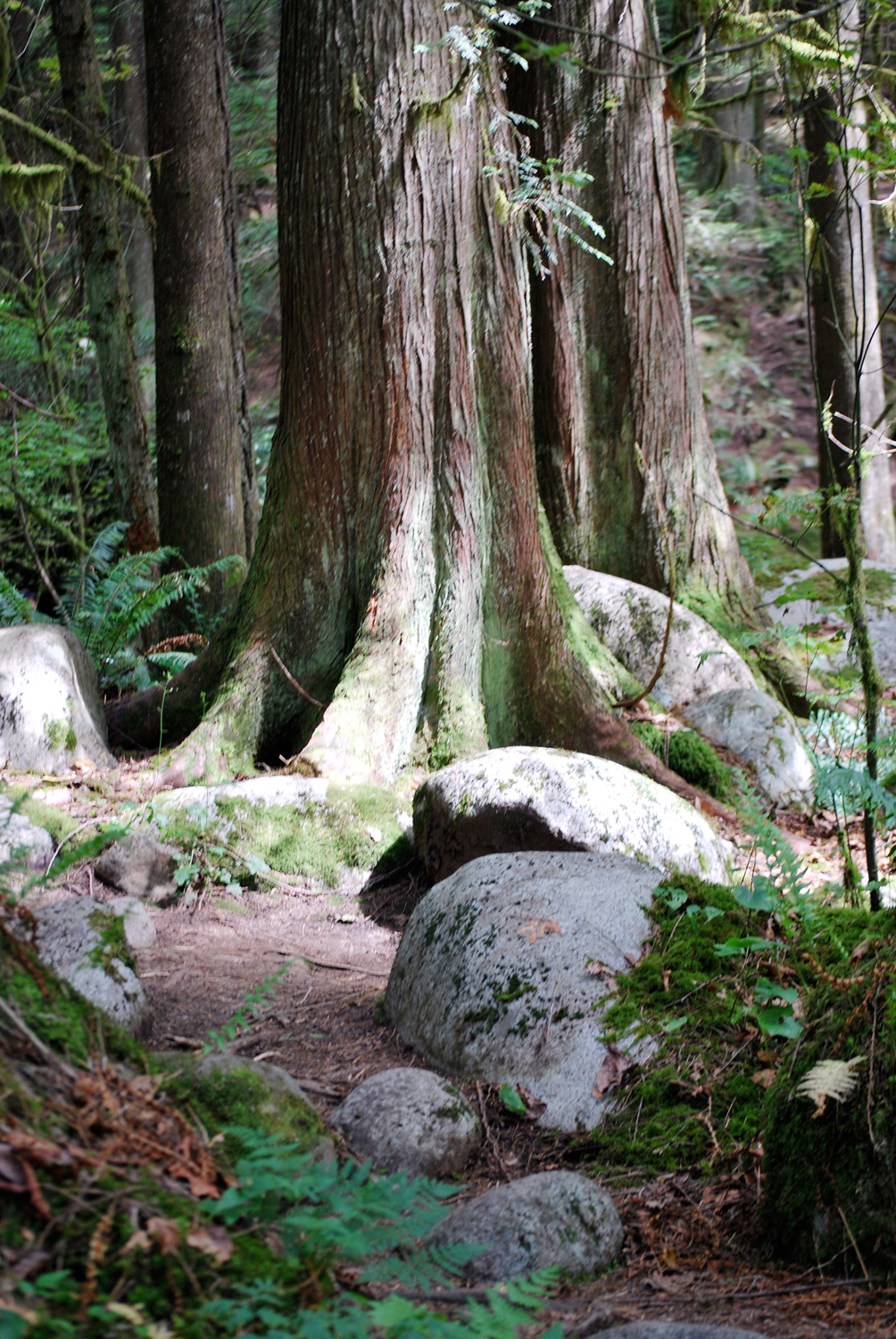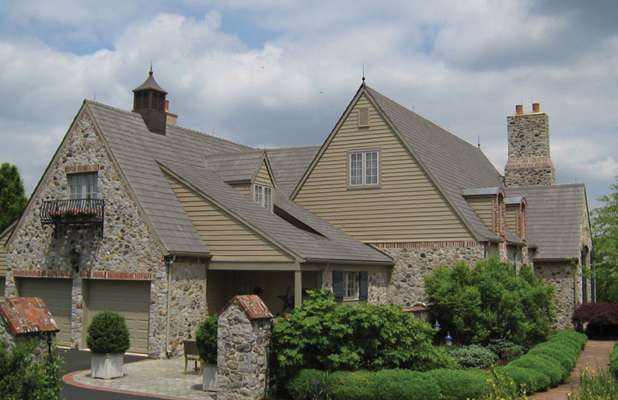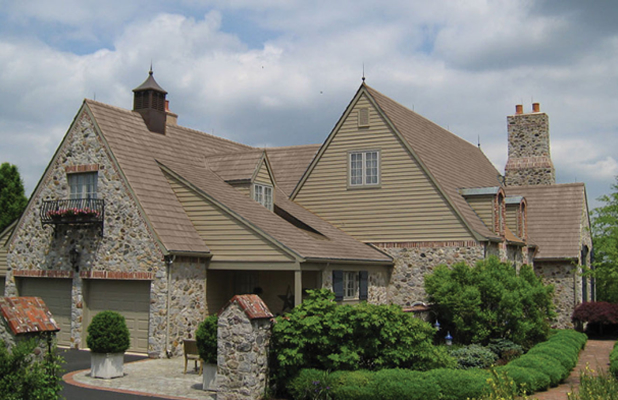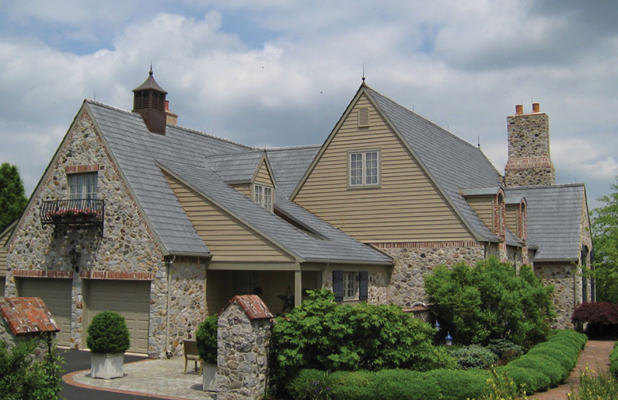The Story of Cedar – Four companies travel to British Columbia to explore the origins of Western Red Cedar
This article was previously published in Suburban Life magazine, September 2012
 “Want to head in?” asked Vic Carrao, captain and owner of STS Guiding Service in Mission, British Columbia. It had been a long day fishing on the Fraser River, east of Vancouver. The fishermen included four visitors from the East Coast of the United States; Brian Pott and Mike Malone of The Cedar Roof Company and Kerry Moleski of Bradco Supply, all from Malvern; and Mark Carroll of Capital Forest Products, based in Maryland. All were guests of The Waldun Group, one of the world’s largest cedar-products manufacturers, there to learn about the lumbering and production of the area’s indigenous cedar.
“Want to head in?” asked Vic Carrao, captain and owner of STS Guiding Service in Mission, British Columbia. It had been a long day fishing on the Fraser River, east of Vancouver. The fishermen included four visitors from the East Coast of the United States; Brian Pott and Mike Malone of The Cedar Roof Company and Kerry Moleski of Bradco Supply, all from Malvern; and Mark Carroll of Capital Forest Products, based in Maryland. All were guests of The Waldun Group, one of the world’s largest cedar-products manufacturers, there to learn about the lumbering and production of the area’s indigenous cedar.
As Carrao began to raise the anchor, Waldun mill owner Curtis Walker saw the tip of one fishing pole dip and, as instructed, jerked the fishing pole from its cradle to set the hook. “I knew as soon as I did that, it was much heavier than the others had been,” he said, referring to the three sturgeon the fishermen had hooked earlier that day. As he wound the reel, pulling the prehistoric-looking fish toward the surface, it leapt from the water, revealing its impressive size.
Carrao decided to guide the boat into shallow waters so they could land the fish, as it was certainly too large to lift into the boat. The other men aboard scrambled to don waders, secure the anchor and photograph the event. Several minutes later they waded into the cold water and together lifted the 7’10” fish for a memorable picture, before releasing the protected species into the watery depths.
While this fishing excursion may have been the highlight of their trip, it is not the first time these men—and their companies—have worked together to bring one of Canada’s great natural resources to the public.
Western red cedar, which comes from the very large and long-lived Thuja plicata, is a beautiful, durable and sustainable lumber product. The soft red-brown timber has a tight, straight grain and few knots. It is naturally rot resistant thanks to thujaplicin, a chemical substance found in the mature trees that serves as a natural fungicide, the effect of which can last a century after the tree is felled. The wood is also lightweight, impact resistant and offers a high R-value, a measure of insulation. All these attributes make it an ideal roofing material for a variety of climates.
It is the official provincial tree of British Columbia and has extensive applications for the native First Nations of the Pacific Northwest. As such, it is rigorously regulated. British Columbia harvests less than 1 percent of its forests and the Canadian government strictly administers the reforestation of these areas. “If it was the end of trees, it would be the end of our business,” says Walker, who one day hopes to pass ownership of the mill on to his children, just as his father did.
Wynn Walker built the mill in 1974. His son, Curtis, remembers stories of living in the office building during the early years of its operation. Waldun Forest Products is now a part of the Waldun Group, which produces cedar shakes, shingles, siding, garden structure and cedar lumber at several facilities. Today Waldun is run by three partners; Curtis manages the sales and marketing while Alec Clark handles the raw material and Kirk Nagy serves as the company CFO. All three men agree Waldun takes pride in producing some of the world’s best cedar roofing and siding products.
Why to Choose Waldun Cedar Shakes and Shingles
After being harvested and milled in British Columbia the cedar shakes and shingles produced by Waldun are brought to the United States by Mark Carroll, a lumber trader specializing in cedar for Capital Forest Products. He distributes these high quality products to wholesalers such as Bradco Supply, where Kerry Moleski manages the sale of high-end construction materials to contractors. The final step in a cedar roof’s journey is with the contractors who install and care for these beautiful and durable wood roofs.
Brian Pott, co-owner of the Cedar Roof Company in Malvern, is one such provider. Led by installation manager Mike Malone, the company specializes in the installation, repair, cleaning and preservation of cedar shake and shingle roofs. With more than 2,800 active customers and membership in local business and industry organizations—including the Cedar Shake and Shingle Bureau (CSSB)—they are, in fact, the only company in southeastern Pennsylvania with a service department dedicated to maintaining and repairing wood roofs.
Cedar shakes and shingles come in a range of lengths, thicknesses and grades, installed with different amounts of reveal. The highest-quality grades of cedar contain what is known as “edge grain,” which prevents warping and splitting as the wood dries. This is created by making straight cuts perpendicular to the grain, or direction that the fibers run. So-called “flat grain” is a lower quality product that is more subject to moisture damage. Waldun’s premium grade offers 100 percent edge grain, while No. 1 consists of 80 percent edge grain and 20 percent flat grain.
Because of its beauty and durability, cedar has been used in this area for decades; the historic buildings of Valley Forge and Independence Mall are roofed with it. In fact, Moleski was responsible for overseeing the installation of historically accurate cedar shakes, custom milled by Waldun, during the 2010 restoration of Independence Hall, an accomplishment in which he takes considerable pride. Other notable locals to have used Waldun cedar-roofing products include Eric Lindros and John LeClair, formerly of the Philadelphia Flyers.
How to Avoid Poor Quality Cedar Products
According to Mark Carroll, in the 1980s, the Mid-Atlantic market was exposed to a considerable amount of off-grade wood. By using lesser-quality logs, cutting with less precision and packing to less stringent standards, some mills saved money on labor and material costs but produced substandard material. Homeowners and contractors who were sold these products during the building boom were not educated about the inferior grades being used. A poor economy was the root cause of the cost cutting then and, because of the recent decline in home values, Carroll sees these practices on the rise again. This explains the shortened life cycle of some homes’ wood roofs and why their owners may be reluctant to use cedar over alternative products. Some off-grade mills will work with a contractor’s price requirements by producing a lesser-quality material to meet the pricing demands. “Unfortunately not all cedar is created equally,” Carroll notes. “To some mills a No. 1 label represents what they can get away with rather than the actual published grading rules. The homeowner is generally not aware of the sacrifices being made in quality in order to achieve a lower price. The homeowner never chooses to have an off-grade roof; it is the responsibility of the industry to educate homeowners and contractors alike of the differences in quality from one mill to the next.”
And the problem exists at all levels of the industry. Moleski says, “There are wholesalers who buy noncompliant cedar roofing and then sell them to contractors for less than the on-grade materials.”
Homeowners rarely know the difference for years, because, as Malone says, “Cedar represents itself well. It always looks great, but will it last?” Poor quality shakes and shingles are subject to curling, cupping and splitting, affecting a wood roof’s beauty and reducing its lifespan. Instead, Pott says, “We can get the best quality materials; we can offer the best installation and maintain it every five to six years. It will look great and you’ll never have to replace your wood roof.”
The Five Steps to Top Quality Cedar Shakes and Shingles
These men are passionate about the industry, though, and committed to changing it. They know that, when correctly harvested and milled, cedar shakes and shingles are not only beautiful but also durable, long lived, energy efficient and environmentally friendly. Cedar roofing is the reason they gathered recently in British Columbia—the reason three of them flew across the continent: to see how top-quality cedar shakes and shingles are milled and discuss how, by working together, their four companies can reverse the market and improve cedar’s image.
Waldun begins with high-quality western red cedar trees harvested on Vancouver Island and pulled up river in long bundles. Waldun purchases only mature, straight trees for its premium shakes and shingles. Each log is sorted for various product requirements before even entering the mill. Once there, it is washed to remove mud and debris, then cut into rounds and split to reveal its grain. Experienced deck crews decide if it will be a hand split or sawn product.
Rustic-looking shakes are created using the hand-split technique. The hydraulic splitters used by Waldun ensure a consistent cut along the grain. Shingles are a taper-sawn product that relies on skilled workmen to trim and sort them to the appropriate thickness and grain. Waldun separates the grain of its shakes and shingles; others throw it in one bin and sort while packing. These mills cannot guarantee the flat grain content in their bundles is as advertised and required by the CSSB.
Waldun is the largest member of this organization and, even so, insists that it use the strictest third-party grading agency available to certify that its members’ products meet the requirements of CSSB endorsement. To ensure compliance with CSSB standards, Waldun schedules three quality-control employees to supervise each of its shifts.
“Some mills pack excessive amounts of flat grain into their bundles,” says Walker. “Waldun counts every piece, ensuring our customers get no more than 20 percent flat grain in every No. 1 bundle of shakes we produce. That is the grading rule, and we don’t break it to lower our price. It is our philosophy.” The quality of its product is something in which all Waldun’s employees take a lot of pride. “In fact every product we produce is 100 percent guaranteed to be on grade or better. We have warranties signed in ink to stand behind it.”
Waldun’s products are not only backed by the CSSB’s warranty but also their own, whereby they will supply replacements or a refund for any defective shakes or shingles that cause a leak. “Some [bureau] members will not warranty their product,” Nagy says, “because if you only make some good products, but not all, how do you warranty any of them?” He has even been called to inspect homes where the contractor has used an inferior product but tried to pass it off as Waldun.
Choosing a Great Roofing Contractor
After 22 years in the business Malone and Pott agree they are seeing a lot of bad wood being installed. The Cedar Roof Company doesn’t take any chances with its clients’ satisfaction. The company backs the wood roofs it installs with its own additional warranty, one that warrants the roof installation to be free from leaks for a period of 15 years and also covers the cost to repair any interior damage resulting from the leak. With regular maintenance this coverage can be extended for the life of the roof. “If you are going to be a great contractor you need to take care of [the roof] for the homeowner—not leave it up to them,” says Pott.
At the conclusion of their visit, after touring the mill; after witnessing enormous western red cedar trees growing in their natural habitats of Lynn Canyon and Stanley Park; after enjoying fresh caught salmon grilled on cedar planks at Walker’s home; and, of course, after that memorable fishing trip, the representatives of The Waldun Group, Capital Forest Products, Bradco Supply and The Cedar Roof Company returned home committed to working together to ensure the continued supply, installation and care of high-quality cedar roofing for this generation of homeowners and many more.
Curtis Walker and Kirk Nagy
Waldun Forest Products
9393 287th Street | Maple Ridge, BC V2W 1L1
Canada
604-462-8266 | waldun.com
Mark Carroll
Capital Forest Products
P.O. Box 6213 | Annapolis, MD 21401
410-280-6884 | www.capitalforest.com
Kerry Moleski, Outside Sales
Bradco Supply
25 Spring Mill Drive | Malvern, PA 19355
800-524-5950 | www.bradcosupply.com
Brain Pott, Owner
The Cedar Roof Company
185-1 Lancaster Ave. | Malvern, PA 19355
610-647-3099 | www.cedarroof.com
Near midnight on August 26, exactly one month after these men gathered at the Waldun Forest Products mill, it was destroyed by fire. Although no one was injured in the blaze, it has left Walker, Nagy and their employees devastated. Up to 60 workers were left without jobs. Those interviewed by the Vancouver Sun called it a good company with an excellent safety record and said how nice the owners were. Nagy told reporters that the company will be trying to find work for its employees—some of whom have been with the company for more than 20 years. He and Walker are optimistic about the mill being rebuilt—better than before—incorporating the latest technology and equipment. “We are fine and will be up and running soon,” says Walker. He plans to use Waldun’s existing inventory and his connections in the British Columbia lumber industry to ensure a continuing supply of high-quality cedar.
The Cedar Roof Company, Capital Forest Products and Bradco Supply all remain committed to providing this region with the very best cedar products through Waldun. “This changes nothing,” says Pott. “We continue to support Waldun and its employees. Knowing what an optimist Curtis is, I have no doubt he will overcome this setback and transform the industry.”
Editor’s note: News of the fire and the immediate aftermath came to us only days before print, but the story does not end here. We will continue to follow the story of Waldun Forest Products and provide readers with an update to the developing story.





